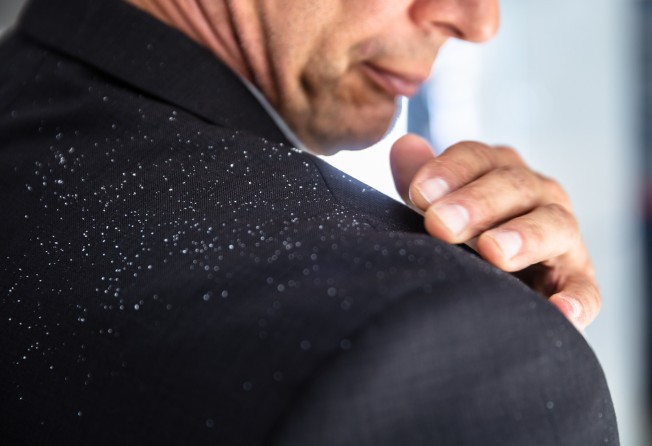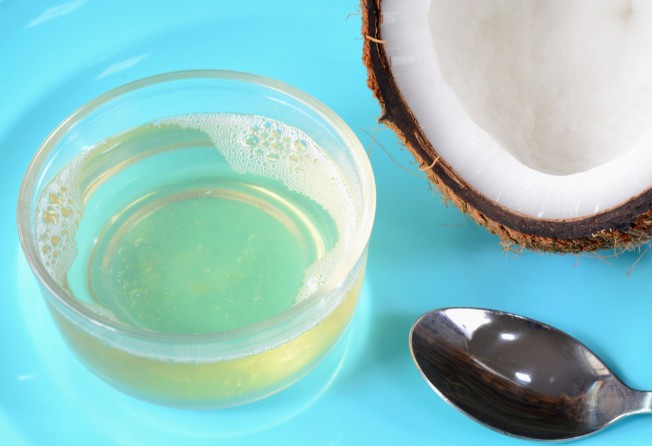
Do you have a flaky, scaly or itchy scalp? It could be dandruff – here’s expert advice on how to treat it
- Stress from the pandemic may be behind a recent rise in the number of people dealing with scalp conditions such as dandruff
- Scalp experts share advice on how to treat the condition, from daily washing to scalp massages once or twice a week to dietary changes

Here’s an unexpected health concern that stems from the coronavirus pandemic: a flaky, scaly and sometimes itchy scalp.
“Since the pandemic began, people who never had scalp issues before suddenly experienced dandruff or an itchy scalp, an excessively oily scalp and pimples or acne on their scalp,” says Singapore-based trichologist Kim Fong.
That’s because stress plays a role in our scalp’s health, Fong says – and who has not faced increased stress since Covid-19 began?
Andrea Clark, a trichologist and hairstylist who works in Hong Kong and Australia, regularly sees clients, men and women of all ages, with dandruff – one of three common scalp conditions.

People with dandruff often they believe it is caused by a dry scalp when it is actually oily. An overgrowth of a type of yeast called Malassezia is the cause – it helps skin cells grow and reach the surface much faster than the normal 28 to 30 days.
Seborrheic dermatitis, also known as eczema, is an inflammatory skin disorder that also affects the face and torso. According to Clark, the problem presents as yellow, flaky scales.
It affects the areas around the front of the scalp rich in sebaceous glands and the skin is often itchy and red. The cause of this condition isn’t known, but Clark says genetics may play a part.
“Psoriasis is another problem that can affect the scalp,” she says. “The scales are usually dry and silvery and the skin is red and inflamed. Itching isn’t a normal feature of psoriasis but it can be. Psoriasis is quite common and is often triggered by stress. Sufferers tend to have a genetic predisposition to it.”
Of the three conditions, Clark says that dandruff is the easiest to control using products recommended by a trichologist, barber or hairstylist. Seborrheic dermatitis and psoriasis require special topical creams and a consultation with a general practitioner, dermatologist or pharmacist.

Common causes of scalp conditions
If you are among those who have those unsightly flecks of skin sprinkling your shoulders, certain lifestyle and environmental factors may compound it, Fong says. Eating an unhealthy diet and using the wrong hair products are two common culprits.
The climate you live in also affects scalp health, says Ceavier Lam, a trichologist at Svenson Hair Centre in Hong Kong.
“Living in a hot, humid place causes the sebaceous glands in your scalp to work overtime, thus causing a build-up of excess oil, dead skin cells and bacteria on the skin. If you live in a cold, wintry climate, you may experience a dry scalp and notice an excessive shedding of dry, dead skin.”
Clark says dandruff may also be triggered by allergens in certain hair products, excessive perspiration on the scalp and infrequent shampooing.

How to treat dandruff
To minimise the itching, flaking, shedding and discomfort dandruff causes, it’s important to keep your scalp clean and to follow healthy lifestyle habits.
Here are a few ways to take charge:

1. Massage your scalp
Once- or twice-weekly massages can improve blood circulation in the scalp, boosting hair cell activity and production within the hair follicles, says Fong.
“Using an essential oil or a recommended scalp solution, massage your temples, crown, the back of your head, behind your ears and the nape of your neck. Press your fingers firmly onto your scalp and use gentle clockwise motions. Avoid pulling your hair. Each session should not exceed 15 minutes.”
Massaging the scalp also has a de-stressing effect as it helps to release tension, says Lam.
Avoid massaging too frequently – Lam says this may stimulate the sebaceous glands in the scalp, leaving the skin greasy.
2. Cleanse your scalp daily
“Some people think that daily cleansing causes hair loss but that’s not true, because a clean scalp is a healthy scalp,” says Clark.
“Daily cleansing with an anti-dandruff shampoo gets rid of the flakes and prevents them from returning. Once the condition improves, use the anti-dandruff shampoo weekly.”

3. Give yourself a “sacial” (scalp facial)
Clark recommends doing what she calls a “sacial”, or a facial for the scalp, twice a month at home. This includes wetting the hair in the shower and then exfoliating with a gentle scalp scrub.
Next, cleanse with an anti-dandruff shampoo and apply a scalp mask. Use the time while the mask is on to massage your scalp. After conditioning and towel drying your hair, Clark suggests applying a tonic, like natural witch hazel, to the scalp. Don’t rinse it out, as it has anti-itching and antimicrobial properties.
4. Don’t scratch
As itchy as your scalp may feel, don’t scratch the area because this will only make the problem worse. Instead, Clark says to spray or dab witch hazel onto the itchy spots to help soothe the skin.

5. Apply coconut oil
If you’re looking for an affordable and effective home remedy for dandruff, Clark recommends applying coconut oil to your scalp once a month, leaving it on for 20 minutes. Coconut oil has antibacterial properties, which will keep your scalp in good condition.
6. Live a healthy lifestyle
“Since stress can trigger the shedding that causes dandruff, I’d advise you to try and reduce whatever might be causing you stress and to get sufficient quality sleep every night,” says Clark.
“Keeping your gut healthy is also important, so eat gut-healthy foods, drink plenty of water, avoid sugar and processed foods, and, in some cases, avoid gluten.”